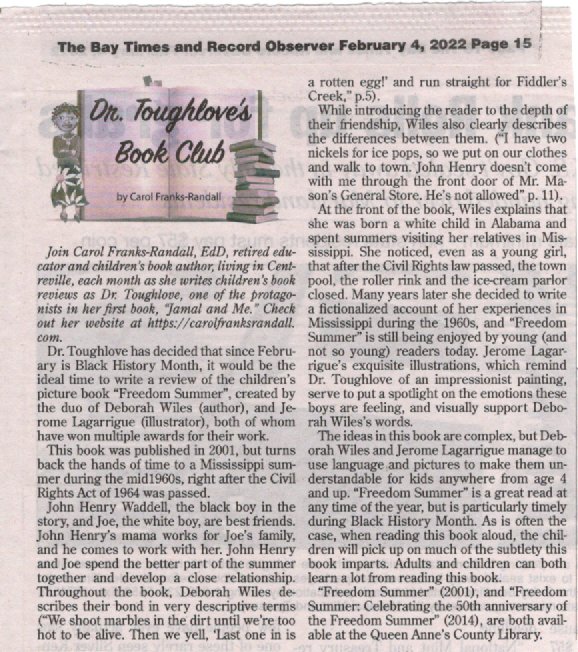For Black History Month, Dr. Toughlove spotlights “Freedom Summer”, written by Deborah Wiles and illustrated by Jerome Lagarrigue

Dr. Toughlove has decided that since February is Black History Month, it would be the ideal time to write a review of the children’s picture book “Freedom Summer”, created by the duo of Deborah Wiles (author), and Jerome Lagarrigue (illustrator), both of whom have won multiple awards for their work.
This book was published in 2001, but turns back the hands of time to a Mississippi summer during the mid1960s, right after the Civil Rights Act of 1964 was passed.
John Henry Waddell, the black boy in the story, and Joe, the white boy, are best friends. John Henry’s mama works for Joe’s family, and he comes to work with her. John Henry and Joe spend the better part of the summer together and develop a close relationship. Throughout the book, Deborah Wiles describes their bond in very descriptive terms (“We shoot marbles in the dirt until we’re too hot to be alive. Then we yell, ‘Last one in is a rotten egg!’ and run straight for Fiddler’s Creek,” p.5).
While introducing the reader to the depth of their friendship, Wiles also clearly describes the differences between them. (“I have two nickels for ice pops, so we put on our clothes and walk to town. John Henry doesn’t come with me through the front door of Mr. Mason’s General Store. He’s not allowed” p. 11).
At the front of the book, Wiles explains that she was born a white child in Alabama and spent summers visiting her relatives in Mississippi. She noticed, even as a young girl, that after the Civil Rights law passed, the town pool, the roller rink and the ice-cream parlor closed. Many years later she decided to write a fictionalized account of her experiences in Mississippi during the 1960s, and “Freedom Summer” is still being enjoyed by young (and not so young) readers today. Jerome Lagarrigue’s exquisite illustrations, which remind Dr. Toughlove of an impressionist painting, serve to put a spotlight on the emotions these boys are feeling, and visually support Deborah Wiles’s words.
The ideas in this book are complex, but Deborah Wiles and Jerome Lagarrigue manage to use language and pictures to make them understandable for kids anywhere from age 4 and up. “Freedom Summer” is a great read at any time of the year, but is particularly timely during Black History Month. As is often the case, when reading this book aloud, the children will pick up on much of the subtlety this book imparts. Adults and children can both learn a lot from reading this book.
“Freedom Summer” (2001), and “Freedom Summer: Celebrating the 50th anniversary of the Freedom Summer” (2014), are both available at the Queen Anne’s County Library.
